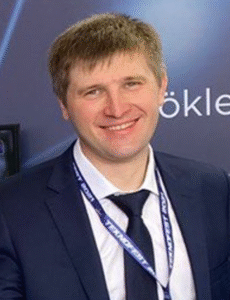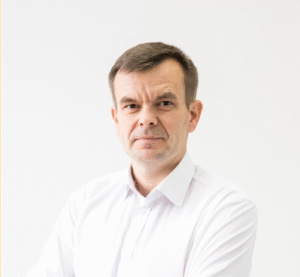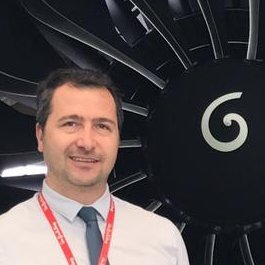Industry Speakers
(All speakers are sorted alphabetically)

Dmytro Demydenko
Director of Aviation Technology and Engine Engineering, Unmanned Systems, Baykar, Ukraine
Presentation Title: BAYKAR’s Unmanned Systems
In today’s world, unmanned systems are becoming a key factor in the military and civilian spheres, as they combine mobility, flexibility, and high-precision technologies. BAYKAR, a leading company in the development and production of unmanned aerial vehicles, is shaping a new global market for unmanned platforms. BAYKAR products have played a very important role in defending Ukraine’s territory and sovereignty in the war. At the same time, BAYKAR also widely initiates and supports social projects and provides humanitarian aid to Ukraine. With the assistance of the Turkish team, the Ukrainian company Avia Ventures was established to service Bayraktar products. We would like to review one of the new developments is a hybrid reconnaissance UAV with a vertical take-off and landing system.
Dmytro Demydenko has been the director of aviation technology and engine engineering at Avia Ventures since 2024. Prior to that, worked for 16 years at an aviation company, rising from design engineer to director of aviation manufacturing production. He was involved in the development of aircraft engines and organized the repair of aviation manufacturing.
1- Unmanned systems
2- Unmanned aerial vehicles
3- Design of aviation manufacturing
4- Production of aviation manufacturing

Dzhurynskyi Oleksandr
Boeing Ukraine, Engineering Team Leader/Technical Team Leader, Supply Chain Engineering – Spares, Ukraine
Presentation Title: Boeing Engineering Ukraine: Capabilities, Innovations, and Impact
Boeing Engineering Ukraine provides comprehensive engineering support for Boeing’s commercial aircraft, combining advanced technical expertise with producibility and regulatory compliance. Teams produce high‑fidelity CAD models and assemblies, define manufacturing and joining methods, and optimize process capability while authoring assembly procedures. We design and integrate avionics and electronic systems addressing EMI/EMC and certification interfaces, and maintain engineering and maintenance documentation to regulatory standards. Structural and fatigue validation is performed via FEA, and reliability is enhanced through root‑cause analysis and FMEA. Interior engineering focuses on weight, compliance, and human factors, while troubleshooting guides and maintenance task cards support operations. Rigorous configuration control ensures traceability and airworthiness, accelerating innovation and improving safety, reliability, and lifecycle cost.
Oleksandr holds a Master’s degree with honors from the National Aerospace University (Kharkiv), Faculty of Aircraft Building, specializing in Maintenance of Aircraft and Engines (2008–2014). He began his career as a Design Engineer at Kharkov State Aviation, contributing to fuselage structures for the An‑140, An‑74 and An‑72, then moved to SPIATEKHNICK «JAMCO» to develop interior elements for commercial wide‑body aircraft including Boeing 777, 787 and Airbus A380. As Deputy Chief Design Engineer at Progresstech‑Ukraine (Kiev Boeing Design Center), he created parts, assemblies, drawings and specifications while mentoring and training team members and participating in hiring. Currently at LLC BOEING UKRAINE, Oleksandr provides continuous support to the team, ensures quality of work, and facilitates engineers’ professional development through training and mentoring. Known for technical rigor, attention to producibility and regulatory compliance, and collaborative leadership, he effectively bridges design and manufacturing to deliver safe, reliable, and manufacturable aircraft components that meet program and certification requirements.
1- Boeing Engineering Ukraine
2- aircraft engineering
3- interior engineering
4- FEA and fatigue analysis
5- producibility and manufacturing

Maksym Gladskyi
HR Director, Progresstech, Ukraine
Presentation Title: Industry-Driven Training Programs for Aerospace Professionals
This paper presents the experience of Progresstech Ukraine in developing and implementing industry-driven training programs for aerospace professionals, designed in close collaboration with leading global aerospace companies and academic partners. The programs focus on advanced engineering disciplines, including aircraft design, structural analysis, digital manufacturing, and systems integration, while incorporating modern educational technologies and project-based learning. A key element of these initiatives is the integration of real industrial projects into the training process, ensuring that graduates acquire both theoretical knowledge and practical skills aligned with current industry demands.
Beyond technical outcomes, the programs have demonstrated significant social effects. They provide young engineers with competitive career opportunities in the high-tech sector, reduce workforce migration by creating attractive professional pathways in Ukraine, and foster long-term human capital development. Additionally, these initiatives strengthen the cooperation between universities and industry, contributing to sustainable innovation ecosystems and regional economic resilience. By combining professional training with social responsibility, Progresstech Ukraine’s approach represents an effective model for preparing a new generation of aerospace engineers capable of addressing global challenges.
Maksym Gladskyi, PhD, is an Associate Professor at the National Technical University of Ukraine “Igor Sikorsky Kyiv Polytechnic Institute,” Department of Manufacturing Engineering. His research focuses on the mechanical behavior of materials, fracture mechanics, fatigue analysis, finite element modeling, and machining processes. He has co-authored widely cited publications on multiaxial fatigue, notched material behavior, and predictive modeling of machining forces, including collaborations with leading scholars such as Dr. Ali Fatemi.
Dr. Gladskyi was a Fulbright Visiting Scholar at the University of Toledo, where he advanced his expertise in material mechanics and international collaboration. His academic profile is represented in ORCID, ResearchGate, and Google Scholar, and his work continues to contribute to advances in stress analysis, structural mechanics, and manufacturing technologies.
Alongside his academic role, Maksym Gladskyi also serves as HR Director at Progresstech Ukraine, a leading engineering services company. This dual role reflects his commitment not only to advancing research and education in engineering but also to fostering organizational development and talent management within the aerospace and engineering sectors.
1- Aerospace engineering;
2- Engineering education;
3- Finite element analysis;
4- Fracture mechanics;
5- Industry-driven training;
6- Workforce development

Okan Özkan
myTECHNIC MRO Technical Services A.S., Türkiye
Presentation Title: Sustainability of Electric Vehicles: Myth or Reality?
The sustainability of electric vehicles (EVs) is often highlighted in discussions of decarbonized mobility, yet a critical dimension lies in the recyclability of their core components. While EVs eliminate tailpipe emissions, their environmental footprint remains strongly linked to the production and end-of-life management of lithium-ion batteries. Current manufacturing processes rely heavily on finite and geopolitically sensitive resources such as lithium, cobalt, and nickel. The extraction of these materials not only generates substantial carbon emissions but also raises ethical concerns regarding labor practices and environmental degradation. A growing body of academic research (e.g., Gaines, 2018; Harper et al., 2019; Xu et al., 2020) emphasizes that without robust recycling strategies, EV adoption could merely shift sustainability challenges from fossil fuel dependency to mineral resource scarcity. Despite recent advances in hydrometallurgical and direct recycling methods, large-scale, cost-efficient solutions remain limited, and recycling rates are still far below the levels required for a circular economy. This abstract argues that the myth-versus-reality debate on EV sustainability hinges on whether technological innovation and policy frameworks can close the recycling gap. Ultimately, the future of EVs as a sustainable alternative depends not only on renewable-powered mobility but equally on how effectively the industry addresses the recycling of its materials.
Okan ÖZKAN is a CTO / R&D Director / ISO:27001 Lead Auditor with over 20 years of experience in software development, project management, and innovation. He works at myTECHNIC MRO Technical Services, where he leads the ICT and R&D department and oversees various projects and activities related to software development, vendor management, performance reporting, and cost-benefit analysis. He has implemented web based in-house developed A/C maintenance management software and completed TUBITAK-TEYDEB funded projects. He also certified myTECHNIC as an R&D Center in 2018. The sustainability of electric vehicles (EVs) is often highlighted in discussions of decarbonized mobility, yet a critical dimension lies in the recyclability of their core components. While EVs eliminate tailpipe emissions, their environmental footprint remains strongly linked to the production and end-of-life management of lithium-ion batteries. Current manufacturing processes rely heavily on finite and geopolitically sensitive resources such as lithium, cobalt, and nickel. The extraction of these materials not only generates substantial carbon emissions but also raises ethical concerns regarding labor practices and environmental degradation. A growing body of academic research (e.g., Gaines, 2018; Harper et al., 2019; Xu et al., 2020) emphasizes that without robust recycling strategies, EV adoption could merely shift sustainability challenges from fossil fuel dependency to mineral resource scarcity. Despite recent advances in hydrometallurgical and direct recycling methods, large-scale, cost-efficient solutions remain limited, and recycling rates are still far below the levels required for a circular economy. This abstract argues that the myth-versus-reality debate on EV sustainability hinges on whether technological innovation and policy frameworks can close the recycling gap. Ultimately, the future of EVs as a sustainable alternative depends not only on renewable-powered mobility but equally on how effectively the industry addresses the recycling of its materials.
Before myTECHNIC, he worked as an IT Manager at Group SAGUN, where he planned and realized group companies and factories wide area VPN and WEB based software network. He also worked as a Network & Software Manager at MNG Kargo A.Ş., where he designed and improved Cargo monitoring software and managed infrastructures. He also worked as a Software Engineer at KALEDATA Group, where he analyzed and designed KALE-ERP software’s MRP module. He also worked as a Project Researcher and an Assistant Operator and Network Administrator at Eastern Mediterranean University, where he designed and installed campus wide magnetic stripe card-based security system and trained microprocessors classes as an assistant.
While doing his master’s degree in computer engineering at Haliç University, he worked on artificial intelligence. He also holds a BS in Electrical & Electronics Engineering from Eastern Mediterranean University, where he wrote his thesis on magnetic card based high security safe. He also holds a BA in business administration and a pre-bachelor’s degree in justice from Anadolu University. He is fluent in English and has very good computer skills in various programming languages, ERPs, databases, and software.
He is President of R&D Centers Communication Platform (ARGEMIP), a board member of Information Technology Association (BiTekDer), a member of Foreign Economic Relations Board, Innovative Technologies Section (DEIK), an advisory board member of Halic University and Eskisehir Technical University, a member of The Chamber of Electrical Engineers (EMO), and a member of Informatics Association of Turkey (TBD). He is interested in scuba diving, sailing, golf, woodworking, and model making.
1- Robotic Systems
2- Artificial Intelligence (AI)
3- Innovation Management

Preetwant Singh
SARES Singapore Chapter, Singapore
Presentation Title: The Sustainability of Aviation and the Low Altitude Economy
The aviation sector stands at the crossroads of sustainability, technological disruption, and new economic frontiers. Among these, the Low Altitude Economy (LAE)—encompassing unmanned aerial systems (UAS), urban air mobility, and drone-enabled services—presents both opportunities and challenges for global aviation. This paper explores the sustainability of aviation within the context of the LAE, focusing on how emerging technologies, regulatory frameworks, and operational models can be aligned to reduce environmental impact while enabling economic growth. The integration of sustainable aviation practices with low-altitude operations has the potential to reshape logistics, surveillance, agriculture, and emergency response, but requires careful coordination of safety standards, airspace management, and energy efficiency. Drawing on advancements in green propulsion, digital air traffic management, and scalable training systems, this study highlights pathways to harmonize innovation with sustainability imperatives. The findings emphasize that the success of the LAE depends on balancing technological adoption, regulatory agility, and international collaboration to ensure that aviation’s future growth is both resilient and environmentally responsible.
Preetwant Singh is a transformative leader in aviation, renowned for his pioneering spirit and vision in shaping the industry’s future. With over three decades of experience piloting more than 20 aircraft types, he is the founder of Pegasus-AC/PAC Aviation, a leading provider of innovative training programs. His work has impacted Southeast Asia, where he has educated thousands of aspiring aviators—including over 6,500 children—ranging from enthusiasts to commercial and military professionals.
A recognized authority in sustainable aviation and UAV regulations, Singh actively contributes to advancing the global Low-Level Economy. He holds leadership roles such as VP of World UAVF Singapore Chapter, President of SARES Singapore Chapter
1- Aviation Education
2- Low Altitude Economy
3- Computer Based Training/Simulation with Telemetry
4- Esports
5- Geo spatial Integration




